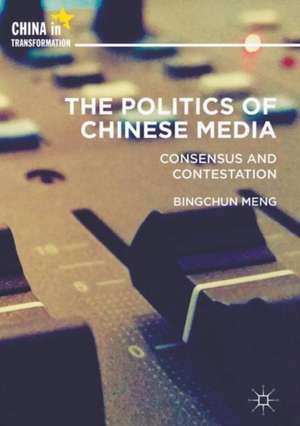The Politics of Chinese Media: Consensus and Contestation: China in Transformation
Autor Bingchun Mengen Limba Engleză Hardback – 10 ian 2018
Preț: 946.24 lei
Preț vechi: 1153.95 lei
-18% Nou
Puncte Express: 1419
Preț estimativ în valută:
181.06€ • 197.29$ • 152.57£
181.06€ • 197.29$ • 152.57£
Carte tipărită la comandă
Livrare economică 23 aprilie-07 mai
Preluare comenzi: 021 569.72.76
Specificații
ISBN-13: 9781137462138
ISBN-10: 1137462132
Pagini: 191
Ilustrații: XI, 225 p. 9 illus. in color.
Dimensiuni: 148 x 210 x 15 mm
Greutate: 0.47 kg
Ediția:1st ed. 2018
Editura: Palgrave Macmillan US
Colecția Palgrave Macmillan
Seria China in Transformation
Locul publicării:New York, United States
ISBN-10: 1137462132
Pagini: 191
Ilustrații: XI, 225 p. 9 illus. in color.
Dimensiuni: 148 x 210 x 15 mm
Greutate: 0.47 kg
Ediția:1st ed. 2018
Editura: Palgrave Macmillan US
Colecția Palgrave Macmillan
Seria China in Transformation
Locul publicării:New York, United States
Cuprins
Introduction: Understanding the Politics of Chinese Media.- The Chinese State: Moving Left? Moving Right? or Depoliticized?.- Looking beyond the Liberal Lens: News Media as Contested Discursive Space.- The Cultural Politics of the Entertainment Media.- From Angry Youth to Anxious Parents: The Mediated Politics of Everyday Life.- Conclusion.
Recenzii
“This is an important and accomplished book that should grace the shelves of everyone with an interest in how to understand the complexities of Chinese media and its intersections with history, politics, political economy and society.” (Jonathan Sullivan, The China Quarterly, Vol. 242, June, 2020)
“In The Politics of Chinese Media: Consensus and Contestation, Bingchun Meng explores how the media industry in China has shaped and been shaped by different agents, showing how consensus and contestation have emerged in different locations. In offering a subtle account that aims to unsettle the oversimplified academic discourse that applies Western theory to Chinese contexts, this book lays a solid foundation for future research on Chinese media” (Meng Hin Ng, LSE Review of Books, blogs.lse.ac.uk, February, 2019)
Notă biografică
Bingchun Meng is an Associate Professor in the Department of Media and Communications at the London School of Economics and Political Science, UK.
Textul de pe ultima copertă
This book offers an analytical account of the consensus and contestations of the politics of Chinese media at both institutional and discursive levels. It considers the formal politics of how the Chinese state manages political communication internally and externally in the post-socialist era, and examines the politics of news media, focusing particularly on how journalists navigate the competing demands of the state, the capital and the urban middle class readership. The book also addresses the politics of entertainment media, in terms of how power operates upon and within media culture, and the politics of digital networks, highlighting how the Internet has become the battlefield of ideological contestation while also shaping how political negotiations are conducted. Bearing in mind the contemporary relevance of China’s socialist revolution, his text challenges both the liberal universalist view that presupposes ‘the end of history’ and various versions of China exceptionalism, which downplay the impact of China’s integration into global capitalism.
Caracteristici
Analyses the consensus and contestations of the politics of Chinese media Considers how the Chinese state manages political communication internally and externally in the post-socialist era. Examines the politics of entertainment media and the power of digital networks






